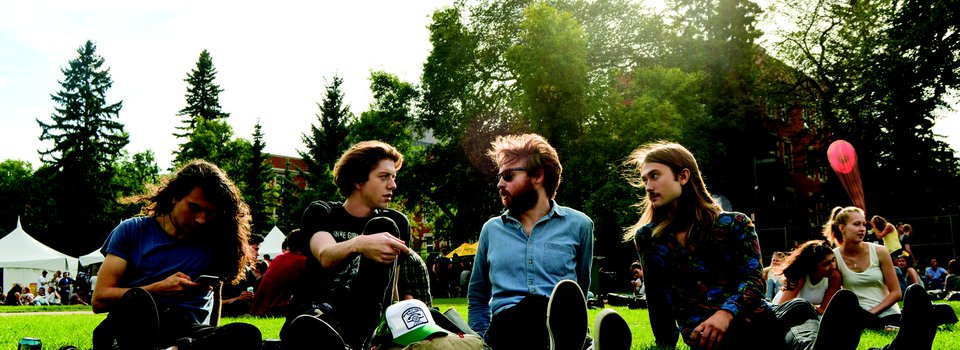Dear President Bill Flanagan, Provost Steven Dew, and Board of Governors Chair Kate Chisholm:
Over the past few weeks, undergraduate students at the University of Alberta have become increasingly concerned with the safety and equity of the University's return to campus plan for Fall 2021. The Students’ Union Executive team shares similar concerns. While we are eager to return to campus and normalcy, we recognize the toll that online learning has had and will continue to have on many students’ mental and social well-being. COVID is not over, and the low vaccination rate among 20-29-year-olds - a group that comprises most of our campus community - presents a unique risk for an outbreak.
On any given day, tens of thousands of people will face lack of space and poor ventilation in our classrooms and hallways, combined with the frequent mixing of large groups. Students often feel intense pressure to attend class and exams regardless of feeling sick, and often have no alternative. Meanwhile, over half our students live off-campus and could live with someone who is older or immunocompromised. Safe and equitable access to education must be our top priority. We urge you to implement more robust precautions to ensure the safety of our campus community and equal education for all.
In online settings, international students have faced immense obstacles to an equitable education throughout this pandemic. With the current return to campus plans, international students face a combination of new and pre-existing challenges that the University has not addressed adequately. The travel ban on flights from India and other countries places a significant burden on the international students to arrive for Fall 2021. Many of these students will not meet that deadline because of limited access to vaccination, medical tests required for travel, or the high costs associated with flights and isolation requirements. This is an unavoidable reality.
We would like to request that you develop a detailed plan for these students to address the following concerns:
-
University Administration needs to provide clear guidelines for types of accommodations generally available for students facing online learning challenges.
-
University Administration needs to inform instructors of foreseeable student issues and how to direct students to appropriate academic supports, and encourage flexibility in finding mutually agreeable solutions to student and instructor challenges.
-
For students who arrive 1-4 weeks into the fall semester for in-person courses that DO NOT require a minimum number of accreditation hours, a blended course option such as a lecture theatre live streaming or recorded lectures should be available to decrease the volumes of accommodation requests. Individualized accommodations must still be available, though.
-
For students who are 1-4 weeks into the fall semester for in-person courses that DO require a minimum number of accreditation hours, deferrals should be granted if we cannot meet what is set out in the previous point. Faculties such as Nursing, Medicine and Dentistry, and Law pose greater challenges because students may have to defer their studies an entire semester/year because of the volume of content they would miss.
-
High occupancy classrooms and lecture theatres should be equipped with 24/7 live stream A/V capabilities so that students can attend class remotely if necessary. This prevents people from coming to class sick if they aren’t feeling well and does not increase instructors’ workloads. Courses that have this option should have it indicated on the course eClass page.
We must also develop stricter guidelines for residences, which pose a unique risk to our community. In residence, thousands of people live in close proximity to each other, often with shared washrooms, cooking facilities, and cafeterias. Outbreaks of other diseases are common. For example, in 2019, Alberta Health Services intervened to shut down events in Lister Hall to limit a severe gastrointestinal disease outbreak.
To keep all students safe and ensure equal access to residence for those with various health conditions and worries about COVID, we would like to request that the University implement:
-
Mandatory vaccination (with medical exemptions) for students living in dormitory-style residences that have shared dining areas, kitchens, and washrooms. Many U15 Canadian Universities have done something similar, including:
-
University of Toronto
-
University of Ottawa
-
Cape Breton University
-
Wilfrid Laurier University
-
University of Waterloo
-
McMaster University
-
-
Mandatory isolation for those with a positive test to prevent spread.
-
Rapid testing for those in residence with symptoms and their close contacts.
-
The creation of two floors in Lister Hall with strict COVID guidelines modelled after the alcohol-free floor. These floors could include more stringent guidelines like masking in public spaces with bathrooms as an exception. These floors would be intended for anyone who wants to follow stricter guidelines and for those who are at higher risk of contracting the virus.
-
The implementation of stricter cleaning precautions.
Across campus, we also require stricter regulations and more planning. We would like to request that the University:
-
Mandates masking in densely-packed areas that are not optional for students, such as lecture theatres, labs, and hallways.
-
Require students who have tested positive for COVID-19 not to attend in-person classes or University activities.
-
Provide rapid testing and wastewater testing on campuses to ensure that our institutions can react promptly in the event of a major outbreak.
We recognize that implementing stricter regulations will be challenging, but we ask the University to go above and beyond the current provincial regulations. These regulations are necessary to prevent another campus closure, protect our students, staff, and families, and ensure equitable access to education in the coming school year.
We hope you will consider these suggestions thoughtfully.
Sincerely,
The UASU Executive Team


